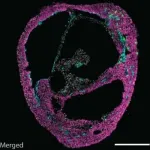(Press-News.org) BOSTON - Screening for colorectal cancer - the second most common cause of cancer-related death in the United States - can save lives by detecting both pre-cancerous lesions that can be removed during the screening procedure, and colorectal cancer in its early stages, when it is highly curable.
Screening is most commonly performed with endoscopy: visualization of the entire colon and rectum using a long flexible optical tube (colonoscopy), or of the lower part of the colon and rectum with a shorter flexible tube (sigmoidoscopy).
This week, the United States Preventive Services Task Force (USPSTF) lowered the recommended beginning age for screening from 50 to 45 for persons without a family history of colorectal cancer. However, its recommendation to continue periodically until age 75, after which the decision to undergo screening can be based on an individual's health and risk factors, remains unchanged.
Yet there has been very little hard evidence to support or contradict the recommendation to stop routine screening at age 75 - until now. As researchers from Massachusetts General Hospital (MGH) report in JAMA Oncology, screening endoscopy for persons older than 75 in otherwise good health can reduce the risk of colorectal cancer incidence and cancer-related death by approximately 40%.
The researchers also found, however, that screening did not provide a significant survival benefit for individuals older than 75 with cardiovascular disease, diabetes or three or more other health conditions.
"Until now, there really weren't clear data to help us decide whether patients should be screened after age 75," says co-investigator Andrew T. Chan. MD, MPH, a gastroenterologist and chief of the Clinical and Translational Epidemiology Unit at MGH. "Current guidance was largely based on modeling and extrapolation of studies conducted in other age groups, and not on solid data to show whether screening was actually helpful in an older population."
To answer this important question, Chan and colleagues looked at data on the incidence of colorectal cancer and colorectal cancer-related deaths among participants in two large U.S. health studies: the Nurses' Health Study and the Health Professionals Follow-up Study. In both, participants fill out biannual questionnaires on demographics, lifestyle factors, screening, medical history and disease outcomes.
For the current study, the investigators examined data on participants who were followed from 1988 through 2016, focusing on the history of screening sigmoidoscopy or colonoscopy in 56,374 who reached 75 years of age during study follow-up.
The researchers identified 661 cases of colorectal cancer and 323 colorectal cancer-related deaths after age 75.
They found that screening after age 75 was associated with a 39% decrease in colorectal cancer incidence and a 40% decrease in risk of death related to colorectal cancer, regardless of whether participants had been screened before age 75.
Among participants who had undergone screening before 75 years of age, screening after age 75 was associated with a 33% reduction in colorectal cancer incidence and a 42% decrease in colorectal cancer-related death compared with those who were not screened after reaching 75.
Similarly, for participants who were screened for the first time only after age 75, the respective declines in incidence and death were 49% and 37% compared with those who were never screened.
In contrast, participants with cardiovascular disease or multiple co-morbidities did not benefit from screening after 75.
"These are the first empirical data that really demonstrate that there is value in continuing screening past age 75 for many individuals. But the key take-home message is that screening should be tailored according to individual risk factors," says Chan.
INFORMATION:
Chan and Mingyang Song, MD, ScD, also a member of the Clinical and Translational Epidemiology Unit, are co-corresponding authors of the study.
The study was supported by grants from the National Cancer Institute and a Stuart and Suzanne Steele MGH Research Scholar award to Chan, and an MGH Executive Committee on Research Tosteson and Fund for Medical Discovery Postdoctoral Fellowship award to lead author Wenjie Ma, ScD.
About the Massachusetts General Hospital
Massachusetts General Hospital, founded in 1811, is the original and largest teaching hospital of Harvard Medical School. The Mass General Research Institute conducts the largest hospital-based research program in the nation, with annual research operations of more than $1 billion and comprises more than 9,500 researchers working across more than 30 institutes, centers and departments. In August 2020, Mass General was named #6 in the U.S. News & World Report list of "America's Best Hospitals."
The discovery of a new species of ancient turtle is shedding light on hard-to-track reptile migrations about 100 million years ago. Pleurochayah appalachius, a bothremydid turtle adapted for coastal life, is described in a new paper published by a multi-institution research group in the journal Scientific Reports.
P. appalachius was discovered at the Arlington Archosaur Site (AAS) of Texas, which preserves the remnants of an ancient Late Cretaceous river delta that once existed in the Dallas-Fort Worth area and is also known for discoveries of fossil crocodyliformes and dinosaurs. P. appalachius belonged to an extinct lineage of pleurodiran (side-necked) ...
For many engineers and scientists, nature is the world's greatest muse. They seek to better understand natural processes that have evolved over millions of years, mimic them in ways that can benefit society and sometimes even improve on them.
An international, interdisciplinary team of researchers that includes engineers from The University of Austin has found a way to replicate a natural process that moves water between cells, with a goal of improving how we filter out salt and other elements and molecules to create clean water while consuming less energy.
In a new paper published today in Nature Nanotechnology, researchers created a molecule-sized water transport channel that can carry water between cells while excluding protons ...
Self-organizing heart organoids developed at IMBA - Institute of Molecular Biotechnology of the Austrian Academy of Sciences - are also effective injury- and in vitro congenital disease models. These "cardioids" may revolutionize research into cardiovascular disorders and malformations of the heart. The results are published in the journal Cell.
About 18 million people die each year from cardiovascular diseases, making them the leading cause of fatalities globally. Moreover, the most prevalent birth defects in children pertain to the heart. Currently, a major bottleneck in understanding human heart malformations and developing regenerative therapies are missing human physiological models of the heart.
The research group of Sasha Mendjan established cardioids ...
NEW YORK, NY (May 20, 2021)--The immune nature of kidney cancer stands out when compared to other cancers: More immune cells infiltrate kidney cancers than most other solid tumors, and kidney cancer is one of the most responsive malignancies to today's immunotherapy regimens.
But despite treatment, many patients with clear cell renal carcinoma--the most common type of kidney cancer--eventually relapse and develop incurable metastatic disease.
A new study shows that the presence of a rare and previously unknown type of immune cell in kidney tumors can predict which patients are likely to have cancer recur after surgery. These cells could even ...
We observe water vapor condensing into liquid droplets on a daily basis, be it as dew drops on leaves or as droplets on the lid of a cooking pot. Since the work of Dutch physicist J.D. van der Waals in the 19th century, condensation has been understood to result from attractive forces between the molecules of a fluid.
Now, an international team of researchers has discovered a new mechanism of condensation: Even if they don't attract each other, self-propelled particles can condense by turning toward dense regions, where they accumulate. The study was published in Nature Physics.
"It's like if cars steered toward crowded areas and made the crowd even bigger," explained Steve Granick, director of the IBS Center for Soft and Living ...
Antiretroviral therapy, the common approach in the treatment of HIV, halts replication of the virus and has saved the lives of millions of people. However, for patients the drug cocktail becomes a lifetime necessity because they continue to harbor latent HIV in a small number of immune system cells. In the absence of treatment, HIV can again replicate and rebound into full blown AIDs.
A new study, however, suggests that addition of a single small molecule can rip away the cloak that shields those cells containing HIV and make them susceptible the patient's own antibodies that otherwise are not normally of much use against HIV.
For the study, a team of researchers ...
HOUSTON - Researchers at The University of Texas MD Anderson Cancer Center have developed a first-of-its-kind artificial intelligence (AI)-based tool that can accurately identify rare groups of biologically important cells from single-cell datasets, which often contain gene or protein expression data from thousands of cells. The research was published today in Nature Computational Science.
This computational tool, called SCMER (Single-Cell Manifold presERving feature selection), can help researchers sort through the noise of complex datasets to study cells that would likely not be identifiable otherwise.
SCMER may be used broadly for many applications in oncology and beyond, explained senior author Ken Chen, Ph.D., associate professor of Bioinformatics ...
A national study from researchers at Michigan Medicine found that nearly 3% of insured U.S. adults under 65 take medications that weaken their immune systems.
The findings, published in JAMA Network Open, are based on data from over 3 million patients with private insurance. They focus on patients' use of immunosuppressive drugs, including chemotherapy medications and steroids such as prednisone.
The analysis reveals nearly 90,000 people met the study criteria for drug-induced immunosuppression that may elevate risk for severe COVID-19 symptoms and hospitalization ...
Young children who practice visual working memory and reasoning tasks improve their math skills more than children who focus on spatial rotation exercises, according to a large study by researchers at Karolinska Institutet in Sweden. The findings support the notion that training spatial cognition can enhance academic performance and that when it comes to math, the type of training matters. The study is published in the journal Nature Human Behaviour.
"In this large, randomized study we found that when it comes to enhancing mathematical learning in young children, the type of cognitive training performed plays a significant role," says corresponding author Torkel Klingberg, professor in the Department of Neuroscience, Karolinska Institutet. "It is an important finding because it provides ...
A particular type of dendritic cell is responsible for the tissue damage that occurs in non-alcoholic steatohepatits (NASH) in mice and humans. The dendritic cells cause aggressive, proinflammatory behavior in T cells, as now discovered by researchers from the German Cancer Research Center (DKFZ) in collaboration with colleagues from Israeli research institutes. Blocking these dendritic cells alleviates symptoms in mice. This type of approach might also prevent the development of serious liver damage in NASH patients.
Obesity is extremely widespread in the Western world, and 90 percent of those affected show signs of fatty degeneration of the liver. If they maintain an unhealthy lifestyle ...




